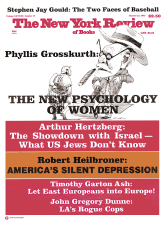In response to:
The Strange Fate of William Faulkner from the March 7, 1991 issue
To the Editors:
Since Frederick Crews has solidified his position on ideological criticism in a number of reviews over the last few years, I have no illusions that I will persuade him that such work has much merit. Nevertheless, I’d like to address a couple of points that might have rounded out his presentation of contemporary Faulkner studies [NYR, March 7].
Given his recognition of the centrality of Cleanth Brooks’ William Faulkner: The Yoknapatawpha Country, Crews shouldn’t be surprised to learn that this study is not out of print, as he tells us in his review. Louisiana State University Press reissued it last year. Crews rightly points out the contradictory position Brooks’ work occupies, simultaneously outdated yet “the most influential…of all Faulkner studies” that “teachers still pull…from their shelves when they want to sort out Faulkner’s bewildering social world.” Presumably if teachers still use Brooks, some students are still getting “the Agrarian party line,” as Crews puts it. Indeed I was pleased that Crews at moments apparently internalized and unconsciously appropriated as his own both my assessment of the limitations of Brooks’ conception of Faulkner’s community and my discussion of the influence of Agrarianism on Faulkner studies.
Crews’ discussion also understates the significance of feminist work on Faulkner in the last five years. He cites in his notes only two feminist studies—one from 1978, the other from 1982. Crews’ survey of current Faulkner criticism would have had better balance, I believe, had he considered Minrose Gwin’s challenging Faulkner and the Feminine: Reading (Beyond) Sexual Difference (University of Tennessee Press, 1990).
Crews may find in the near future fewer books that he can praise, since many in the current generation of critics, for reasons other than fashion, do not feel at home with the criteria Crews uses to evaluate criticism. His “theory-free impressionism,” which makes the critic’s job “less an act of analysis that one of parallel creation in the [author’s] honor,” does not account for the ways that reading calls a text into being. Duplicating the author’s sensibility is scarcely possible, since sensibility is always as conflicted as the culture out of which it develops. A just criticism should not aim at reproducing the racism or sexism of a text but rather should use such moments to think those issues further. If this makes me a moralist, it is a position I willingly embrace over Crews’ denial of the political.
John N. Duvall
Department of English
Memphis State University
Memphis, Tennessee
Frederick Crews replies:
John Duvall is correct in saying that Cleanth Brooks’s first Faulkner study has been reissued. For the record, I did not “tell us” that the book is out of print; The New York Review added that misinformation to my “Books Discussed” headnote.
Duvall flatters himself in deducing that I must have “unconsciously appropriated” his supposedly original critique of Brooks and Agrarianism. As I indicated, it is Duvall himself who has hitched a ride on an anti-Brooks bandwagon that began rolling in the later 1970s. Brooks-bashing has by now become a standard substitute for thought in politically self-righteous Faulkner studies, and Duvall’s Faulkner’s Marginal Couple provides the most egregious example to date.
It is especially curious, in this connection, that Duvall should accuse me of neglecting recent feminist criticism of Faulkner. That is precisely the complaint I brought against his own book, which purports to be up to date in its sensitivity to gender issues. Instead of “building on the considerable body of extant feminist insight into Faulkner,” I said, Duvall pretends to be single-handedly saving us from Brooks’s patriarchal vision. His letter evades that charge and, indeed, my whole detailed critique of his argument.
Duvall’s penchant for straw-man discourse reappears in his attempt to saddle me with “theory-free impressionism” and a “denial of the political.” My recent essays, to which he alludes, are not blanket denunciations of ideological concern but attempts to sift the useful from the coercive in the claims of “New Americanists.” Hence, for example, my endorsement of Wesley Morris’s and Richard Moreland’s demonstration of Faulkner’s widening sensitivity to the oppression of blacks, even while I dissented from their cavalier recourse to armchair psychoanalysis. But in Duvall’s own book, I found that the speculative absurdities (“what is the r but a castrated n?”) were conjoined to a thesis that put Faulkner’s actual development even further out of view.
This Issue
October 24, 1991



